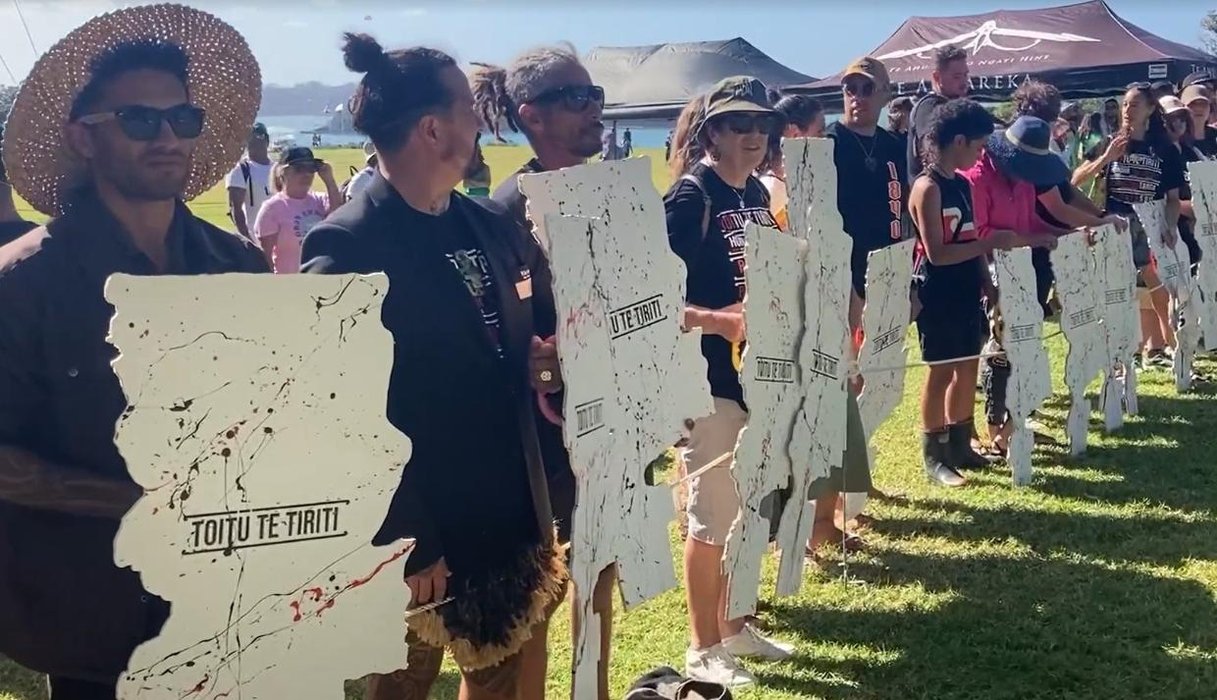
The state of civic space in New Zealand is rated as ‘open’ by the CIVICUS Monitor. Civil society groups are able to form and operate without restrictions, freedom of expression is respected and protected and there are rarely restrictions on protests. However, there have been some incidents of arrest and prosecution of protesters.
In recent months, there have been protests by indigenous Māori peoples and allies against a government bill that will undermine their rights. There have also been mass pro-Palestinian protests with some incidents of arrest and excessive force. Climate protests by students were also reported.
Peaceful Assembly
Māori protesters march to Waitangi to protest against government bill
In February 2024, more than 1,000 people marched into the treaty grounds at Waitangi on New Zealand's north island — the culmination of a week-long protest against a controversial government bill.
Waitangi Day is held on 6th February to mark the anniversary of the Treaty of Waitangi, a foundation document signed by British colonists and Maori chiefs in 1840 that establishes and guides the relationship between New Zealand’s government and its Indigenous population.
The protesters oppose the Treaty Principles Bill, allowing changes to the “principles” of the Treaty of Waitangi. The conservative Association of Consumers and Taxpayers Party (ACT) had proposed a referendum to redefine the “principles” of the Treaty of Waitangi, and their coalition partners - the National and New Zealand First parties - have agreed to introduce the bill. Protesters claim that the Bill would undo policies that supported the official use of the Māori language and improved Indigenous living standards and rights.
In the first weeks of parliament forming, the Maori Health Authority was disestablished, and the government issued an order to the public service to re-name departments in English, removing Maori language names.
Protests against genocide in Gaza continue
Protests continue in New Zealand as government maintains support for US-Israel genocide in #Gaza#NZPolhttps://t.co/Z8nVLXdbtg
— World Socialist Web Site (@WSWS_Updates) April 10, 2024
Thousands of people protested across New Zealand in April 2024 to oppose the genocide against the people of Gaza, which has lasted six months.
More than 2,000 people marched to parliament in Wellington on 7th April 2024, following protests earlier in the week in Auckland, Christchurch, Dunedin and other centres. Protesters denounced the National Party-led coalition government for its complicity in the genocide.
On 1st May 2024, more than 100 students gathered on Auckland University's city campus to protest the war in Gaza. The rally was originally planned as an encampment, but the university said any overnight stand would not be allowed. The demonstration has been organised by Students for Justice in Palestine. The co-president Layah Khalil said the group also had demands for Auckland University to “put out a formal statement saying they're against what's going on in Palestine, and that they don't support the genocide.”
Pro-Palestine protesters arrested after clashes with police https://t.co/75j7iJlBHK pic.twitter.com/dLyqm9F88y
— nzherald (@nzherald) February 6, 2024
There were some arrests during pro-Palestinian protests. Four people were arrested on 6th February 2024 in Lyttelton Port when approximately 60 people took part in a protest, blocking traffic. They were charged with obstructing a public place, resisting police and assaulting police.
Palestine Solidarity Network secretary Neil Scottissued a statement saying members were "repulsed" by police actions at the protest. He said police pepper sprayed many, including senior citizens protesting peacefully. Protest organiser Ihorangi Reweti-Peters told RNZ that police used brute force to stop protesters from blocking the road.
#WATCH: A pro-Palestinian protester has been arrested after climbing onto the Christchurch City Council building. https://t.co/eLfLn1FvyZ
— 1News (@1NewsNZ) May 13, 2024
On 13th May 2024, a pro-Palestine protester who climbed onto a roof of the Christchurch City Council building was taken into custody. Officers could be seen handcuffing the woman as nearby supporters cheered in support. Earlier, a group of protesters gathered in front of the building, calling on the council to support an immediate ceasefire in Gaza — among other demands. Protester Megan Lovelady said she wanted councillors to use their voice to speak out on the situation in Gaza.
Ongoing marches by climate protesters
#WATCH: Thousands of students across the country hit the streets today as part of a call for action on climate change 👇 https://t.co/nTDfSlG6Sl
— 1News (@1NewsNZ) April 5, 2024
On 5th April 2024, thousands of students across the country hit the streets as part of a call for action on climate change, with more than 20 events taking place.
The organisers, School Strike 4 Climate, said their aim is to "raise awareness about the urgent need for climate action and to demand meaningful policy changes to combat the climate crisis".
Demands of those marching included the oil and gas exploration ban remaining in place, upholding Te Tiriti o Waitangi, ending fast-track consenting legislation, protecting New Zealand's oceans and conservation land, climate education for all, and making the voting age 16.
In Wellington, school students and other School Strike 4 Climate protesters marched to Parliament. About 200 people gathered at Te Ngākau Civic Square before marching through the inner city, occasionally chanting slogans including “no more coal, no more oil, keep your carbon in the soil”.